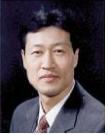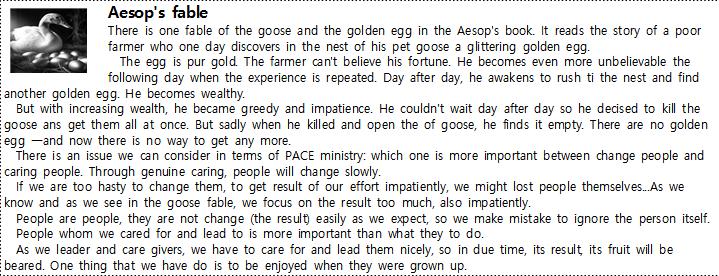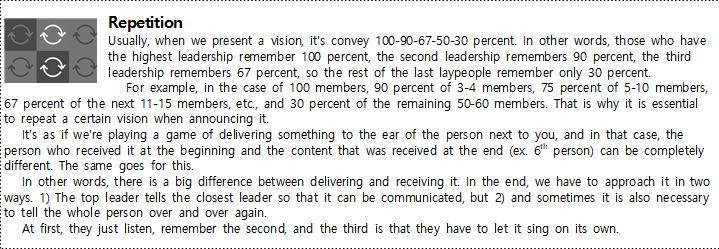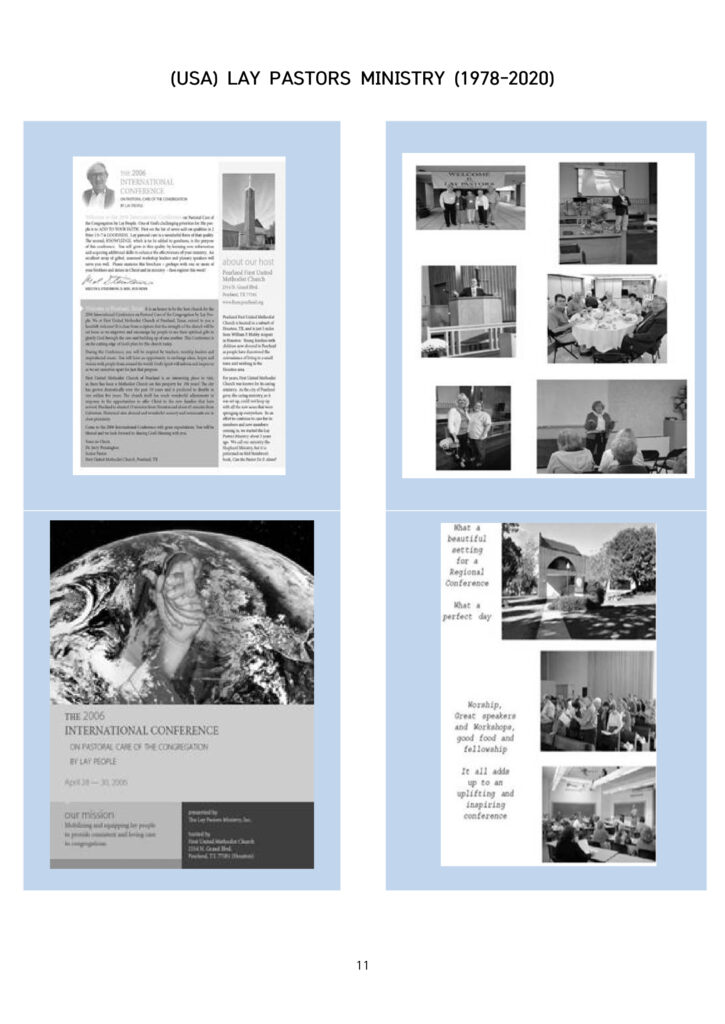#45

 OR
OR
WHY I OUGHT TO BE PART OF THE NETWORK
- By coming together you will be stronger in your ministry.
-creative ideas will be generated which never would have happened staying by yourself.
-your spirit will be supercharged. You will go back with renewed commitment and passion for your ministry. We seldom lack ideas and projects. It is spirit we need.
-you will get a new perspective on your ministry. You will be looking at it from new angles just by talking about it and/or listening to others. Solutions to some of your problems will burst upon you; ideas of how to improve your ministry will hit you: dormant plans will come alive; what seemed to degenerate to the commonplace, routine or unimportant will be regenerated to significance.
- By coming together you will be more productive. Why? Because you will be acting on a fundamental principle running throughout Scripture: the work of God is done by the people of God through mutual submission. It is not by looking out for our own efforts, but by submitting to the gifts and roles of others that His work is accomplished. One reason the disciples could get the Church going in the world is that they had been together.
- By coming together you will be doing something significant for the larger church, the Church of Jesus Christ in the world. You will be doing to leaders of the churches what I Thessalonians 5:11 tells us to do, “Encourage one another and build one another up.” You will be interpreting I Corinthians 12:7 in a universal rather than a provincial way, “To each is given the manifestation of the Spirit (gifts) for its common good.”
“One another” in the I Thessalonians verse is the NETWORK of those who are pastoral leaders of churches. “The common good” in the I Corinthians verse includes all of us in pastoral care leadership. We have leadership responsibilities in common. Coming together to share our gifts will do us all good! including you! ●
COMMENTS
in relation to WHAT’S IN IT FOR ME? OR
WHY I OUGHT TO BE PART OF THE NETWORK

Dr, Melvin’s key words above is “Coming together.” He mentioned three benefits once we coming together: 1) We will be stronger in our ministry. 2) We will be more productive. 3) Doing something significant for the larger church, the church of Jesus Christ in the world.
Of course he wrote more in details on each tag-line mentioned above. Lets take a look one by one. 1) How do we become stronger?: a) creative ideas will be generated. b) our spirit will be supercharged. c) will get a new perspective. In short, creative ideas, our spirit, and new perspective.
1) How do we become stronger? (by coming together)
I am thinking our previous conferences. Because Melvin said these thoughts which are from international conference in the States (I guess it was the First International Conference of LPMI USA). Our cases in Korea; mostly I was trying to held, to make, to prepare conference. We have been held five conferences last 10 years. The very first one was taking place at Hallelujah Church, and also they prepared from the beginning to the end.
From our conferences, creative ideas? our spirit supercharged? and new perspective? Yes, definitely. From the preparation and actual conferences, I have produced many ideas, not saying creative myself, but I can say try to adapt to the given situation, given churches, and to the given people. Whenever I prepared conferences those ideas pop up in my mind, so actually conference just needed for myself, my improvement.
How about our spirit? My spirit had focused on the church, on the ministry, commitment, core value, etc. So my own spirit supercharged definitely. And once we coming together, I mean at conference, my these spirits poured out to those whom attended there.
And through conference, I mean as a leader of conference, I got new perspective on our ministry for now, for near future, also for the next conference.
2) More productive? (by coming together): Melvin related productive with fundamental principle which is from the Scripture. What is that? He assured that the work of God is done by people through mutual submission. So we might conclude that through his concepts here, “to be productive we need mutual submission” to the gifts and roles of others, and each others.
Key words here “to the gifts and roles” of others. What’s that? Everyone, e.g. every member in our Institute, I mean staffs of LPM Korea, they have their own distinctive gifts and roles I found. These two are important and clear among people as we experienced. For instance, our organization was productive definitely last few years. I’d better say at peak time, peak stages. Each one in our staffs were using their gifts and roles maximized. Of course there were different characters, different life philosophy among us so there were, sometimes, disputed each other. but in the midst of it, our fruits, our products, even the results were productive, because we made synergy even each person was different, in terms of opinions, ministry overviews so we need to submit each other finally as Melvin advised.
3) Something significant? (by coming together) for the larger church, the church of Jesus Christ in the world. Lets look at LPM with this concept. As we know LPM is focused on the ‘lay pastoral care ministry’ but it is definitely affective to the universal church, universal ministries in the world. As we are doing this ministry we tend to encourage one another, so build one another up. It’s not only bounded in LPM but spreaded, scattered, and beyond the wall of care and expand to the world.
In conclusion, Melvin stressed on the NETWORK which means ‘one another,’ that is why he putted the title, NETWORK NEWS of their newsletter last thee decades. He pursued not only publishing just Network Newsletter but also “Networking” among those, people and churches that are involved in this ministry. That is his ministry spirit!

Chia Beng Hock, UK, says
The historical development of ecclesiastical hierarchy has brought a divide between clergy and laity. This divide continues to linger in most church structures and it forms a mindset in believers.
This mindset somehow stifles most laypeople from using their spiritual gifts to serve the body of Christ and the community. They are often being overlooked, not developed and not given appropriate platforms or opportunities to serve. Another concern that this paper addresses is the need to establish biblical and theological teachings on clergy and laity. It also examines how historically the divides between clergy and laity emerged and how laity is regaining their role in the ministry.
The qualitative methods used include a survey with 10 AG churches, interviews with 5 senior pastors of growing churches from different denominations that have lay ministry, and 6 narrative studies comprising of 3 lay pastors and 3 lay marketplace leaders to determine how growing churches in Singapore discover, develop and deploy laity to do the work of the ministry, and how laity integrates work and ministry in their churches and marketplace. This study concludes with some practical recommendations to complement roles of clergy and laity, and to empower laity for ministry beyond the church.
Laity is a powerful force in the church. They are filled with the Holy Spirit, endowed with spiritual gifts and entrusted with the power of salvation – the Gospel, to reach the world for Jesus. When clergy takes time to discover, develop and deploy laity in their congregations, they will experience and appreciate this powerful force that God has given to complement them in the ministry and grow His Kingdom!
 In Korea, Hallelujah church adopt this PACE ministry many years ago, were doing very well, even they opened PACE Training Center in the church so produced more than 1,000 lay pastors. Senior pastor David Kim was arguing with his wife for many years because of this calling issue. David Kim constantly insisted to call them ‘lay pastor,’ but his wife was uncomfortable all the time about this naming because many people say this naming is not proper to the laypeople, told her many time. She talk to her husband about it but David Kim was not giving up to call them as “lay pastor” because as Melvin said, the naming is very important, it change people’s mind and soul, and also their identity who they are. He understood the meaning of this ministry exactly.
In Korea, Hallelujah church adopt this PACE ministry many years ago, were doing very well, even they opened PACE Training Center in the church so produced more than 1,000 lay pastors. Senior pastor David Kim was arguing with his wife for many years because of this calling issue. David Kim constantly insisted to call them ‘lay pastor,’ but his wife was uncomfortable all the time about this naming because many people say this naming is not proper to the laypeople, told her many time. She talk to her husband about it but David Kim was not giving up to call them as “lay pastor” because as Melvin said, the naming is very important, it change people’s mind and soul, and also their identity who they are. He understood the meaning of this ministry exactly.
ADDITIONAL COMMENT
by BYEONG
Inactive members of the church: This is also an unavoidable subject in the church. According to one statistic, about 40% of church members in the United States do not attend services regularly, which means they are inactive, passive. Of course, most churches in the world as well as the United States have the same problem, and churches here in Kenya have the same problem. The same is true even in our university church.
Therefore, such the church should pay more attention to those people because there is always a chance and risk of their leaving the church soon. However, most churches ‘close the back door’ too early when those people leave the church. When I was an associate pastor in Korea, I often found such a tendency. In other words, when they leave the church, they quickly forget and closes the back door too hastily, concluding that they have gone. We don’t have to be so hasty, and I think it’s always good to leave the back door open, and give them time and room to think again.
There is one ministry in the States. It was Stephen Ministry (by Dr. Kenneth Haugk) who took this problem seriously in the church of the United States and created it as a ministry of Parachurch organization. Dr. Kenneth Haugk, as a psychology expert, began to ponder, “Why do people become passive and inactive?” So I wrote the book, discovering 33 reasons for being inactive, “Reopening the Back Door”. He also made a 300-page training manual with this book. While I was studying this book and training manual, I translated it into Korean and used it several times during our seminars.
The characteristic of this ministry is a very good training textbook focused on the [caring for people in crisis]. It is a kind of crisis caring ministry. The training textbook shows why people leave the church they had attended for years, with ’33 reasons’ written. This is a useful material for understanding those people. Some of the main reasons for leaving are: 1) lack of good relationships with each other, 2) found the church meaningless, 3) weakened sense of belonging, and so on, and gradually prepared to leave the church as it became inactive. Then, when they left the church, the emphasis was on ‘allowing those who left like that to come back.’ It is said that possible only through one-on-one care, so it is necessary to understand one-on-one. Because each person has a different (33 reasons), so that’s inevitable.
What this resource contributes to is, unconditionally, once people who have become passive in church, and those who have left…rather than closing the back door hastily while leaving out, it is ‘to help them understand why they became passive and why they left the church.’
Another book is “Closing the back door,” which I remember was written by Pastor Myung Sung-hoon a long time ago. The ‘back door should be closed’ so that people who are likely to leave the church cannot leave.
I was very interested to read these two books together. One focused on those who would leave (“Close the backdoor”), and the other on those who had just left. (“Open the backdoor again”). Our Reverend Melvin’s lay pastors’ ministry started with caring for people inside first, but both concepts of caring for both sides of the people who have just left are emphasized.
These two things, Stephen ministry and the lay pastors’ ministry, coexist in the American church. (Stephen Ministry & Lay Pastors Ministry). Most American churches adopt one of these, or some have two ministries at the same time. Of course, there are some ministries developed by local churches (e.g., Caring Church, TLC, so on), but when speaking of the overall American church, they can be represented in these two ways. Anyway, I think it is a continuous task of the church to the inactive members.

이해와 설득
이 두가지는 어떤 그룹이나 팀, 또한 교회에서도 필요하다. 회사나 사업에서도 설득의 기술 같은 책을 많이들 보기에 종종 베스트셀러가 되기도 한다.
이것은 일상적인 평범한 대화와는 다른 긴장감이 있게 마련이다. 특히 큰 변화나 새로운 프로젝트 시도에는 어쩔 수 없는 과정이다.
나는 최근에 학교일로 설득하기도 하고 또 설득당하기도했다. 또 어떤 제안을 거절하기도 했다. 셋다 쉬운 일은 아니었다. 어쩌면 내가 설득한 것에 대해 상대방이 약간의 상처나 오해가 있을 수도 있을 것이다.
우선 설득한 것은 어떤 프로젝트가 꼭 필요한데 상대방이 이해를 못해주는 것이었다. 학교에 재정적으로 도움이 되는 일이다. 아프리카에 있는 학교들은 제일 시급한 것이 재정적인 것이다. 그것이 마련된다고 하면 도적질이 아닌이상 어떤 것이든 해보는 것이 필요하다. 결국 한시간정도 설득 끝에 동의가 되어 추진하기로 했다. 그 과정에서 프로젝트를 제안한 나 자신, 즉 당사자도 상처를 받을수 있음을 이번에 감지했다. 바로 동의안해주면 힘빠지고 맥빠져서 하기가 싫어질 수도 있다. 열심히 며칠 구상하고 연구하여 거의 완성된 제안을 했는데 반대할 경우 당하는 사람은 상황에 따라서, 큰 상처 또는 작은 상처가 될 수 있다. 남을 설득한다는게 얼마나 힘든 가를 이번에 새로이 겸험했다.
또 하나는 내가 설득을 당해줘야 하는 일이 있었다. 들어보니 너무 황당한 일이었다. 학교에 교직원 추가에 관한 것이었다. 처음에는 잘 이해가 안 되었는데, 더 많은 정보를 듣고 나서 수긍하게 되었다. 처음부터 좀 더 많은 자세한 정보를 주었더라면 내가 더 빨리 이해했을 텐데 하는 아쉬움이 남았다. 정보를 부족하게 주었으니 학교 부총장은 완전반대, 다른 주임교수는 부정적인 생각이 강했다. 그래서 내가 외부로 부터 받은 당사자에 대한 신상정보를 더 주고 얘기했더니 둘 다 더 이해가 되었다고 했다.
모든 새로운 사역이나 프로젝트에는 이런 이해와 설득의 단계를 피할 수가 없다. 타인을 이해하는 것은 서로의 관계를 개선하고 신뢰를 형성하는 데에 중요한 역할을 하는 것 같다. 타인을 이해하려면 그들의 이야기에 집중하는 것이 중요하고, 또 공감하고 이해하려는 노력이 필요한데 누구나 다 자신의 감정이나 경험에 대해 이해받고자 하는 욕구를 가지고 있는것 같다. 지나친 비판보다는 이해의 시선을 갖는 것도 좋겠다. 누구나 다 자신의 배경과 경험을 바탕으로 행동하고 말한다. 나 역시도 여기에 해당될 것이다.
타인을 이해하기 위해서는 좀 더 질문을 통해 그들의 생각과 의견을 알아가는 것도 중요하다고 본다. 더 질문하는 것이 번거럽기도 하지만 분명한 내용전달이 필요한 경우는 한번 더 확인해보 는것도 좋을 것이다. 좀 복잡한 문제일 경우에는 다양한 질문이 있을 수도 있다. 상대방에게 관심을 표현하고 이에 대해 질문을 한다면 그들은 더욱 자신의 생각을 나누고 이야기하게 될 것이다. 한 두마디로는 안되는 경우가 많다.
또한 설득이 필요한 경우에는 목적과 의도를 분명히 하는 것이 좋겠다. 좀 까칠한 사람들은 ‘그렇게 하는 목적을 모르겠다’ 고 단도직입적으로 표현하기도 한다. 또한 무조건 받아들이라고 하는 것은 좀 무리인 것 같다. 말을 물가에 데리고 갈 수는 있어도 그 물을 먹고 안 먹고는 그 말 자신의 선택이라는 얘기가 있지 않은가! 그것까지 내 지시대로 하라는 것은 좀 아닌 것 같다. 결국 타인을 이해하는 습관은 지속적인 노력과 연습도 필요하겠지만, 더 중요한 것은 서로의 관계성을 발전시키고, 더나아가 서로가 함께 더 성장하는 기회가 되면 더욱더 좋을 것이다.







